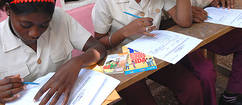Eleven countries revisit regional agreements on sexuality education

- Flickr / American Red Cross
To bolster technical exchange on the implementation of sexuality education and to strengthen sexuality education and sexual and reproductive health programmes in schools are two of the objectives of the Regional Community of Practice on Sexuality Education in Latin America meeting to be held 6 and 7 August 2013, in Lima, Peru.
This event, organized by the UNESCO Regional Bureau for Education in Latin America and the Caribbean (OREALC/UNESCO Santiago) in collaboration with the Peruvian government, will include the participation of various focal points from the health and education sectors of Uruguay, Paraguay, Argentina, Chile, Colombia, Guatemala, El Salvador, Cuba, Mexico, Brazil, and Peru, in order to revisit the agreements made in the 2008 Ministerial Declaration “Education to prevent" and to organise cooperation strategies.
The Ministerial Declaration "Educating to Prevent" was adopted at the First Meeting of Ministers of Health and Education to Stop HIV in Latin America and the Caribbean, held in Mexico City in 2008. At that meeting, thirty Ministries of Health and twenty-six Ministries of Education committed themselves to making prevention a key element in the response to HIV and AIDS. The targets agreed upon by the countries were: to reduce by 75% the gap in the number of schools under the jurisdiction of the ministries of education that have not institutionalized comprehensive sexuality education, and to reduce by 50% the gap in the number of adolescents and youth without a health care coverage that meets their needs appropriately regarding sexual and reproductive health by the year 2015.
To achieve these goals and to ensure comprehensive sexuality education and promotion of sexual and reproductive health for adolescents and youth, the Declaration emphasizes the importance of a strategic partnership between the health and education sectors. The commitment of Latin America and Caribbean countries means promoting and disseminating the content of the Declaration at all levels and sectors, along with allocating resources for real action.
Cooperation strategies such as the technical exchange that will take place in Lima are of vital importance. “We understand a community of practices to be the space and time in which the lessons learned by each of the countries are at the service of others. It will be a privileged opportunity for exchange among the countries in the region in order to enrich the work they are doing in schools so that children and adolescents may have access to sexuality education that is pertinent, complete and relevant ,” states Mary Guinn Delaney, regional advisor for OREALC/UNESCO Santiago.
This regional initiative to create a Regional Community on Sexuality Education Practices is the result of the Regional Project on the Harmonization of Public Policies on Sexuality Education and HIV/AIDS and Drug Prevention in Schools, carried out by the MERCOSUR countries since 2007. Then, with the help of the German organisation GIZ, ONUSIDA and UNFPA, Argentina, Brazil, Chile, Paraguay, Peru and Uruguay embarked upon the implementation of a horizontal cooperation project to strengthen national policies on sex education and HIV/AIDS prevention in schools. Since then, ONUSIDA, GIZ (2007 – 2012), UNESCO and UNFPA have aided this process. Colombia and Guatemala joined this initiative in 2011, with Cuba and Mexico following suit in 2013.
Presently, the Regional Community on Sexuality Education Practices includes technical representatives of the Ministries of Health and Education of twelve countries, as well as representatives of international development cooperation agencies and the United Nations System.
Further information:
- Sexuality Education for HIV prevention UNESCO Santiago
- Event's official website
- UNESCO Clearinghouse on Education & HIV/AIDS
- UNESCO’s strategy for HIV and AIDS (PDF)
- UNESCO’s Short guide to the essential characteristics of effective HIV prevention (PDF)
- 29-07-2013

